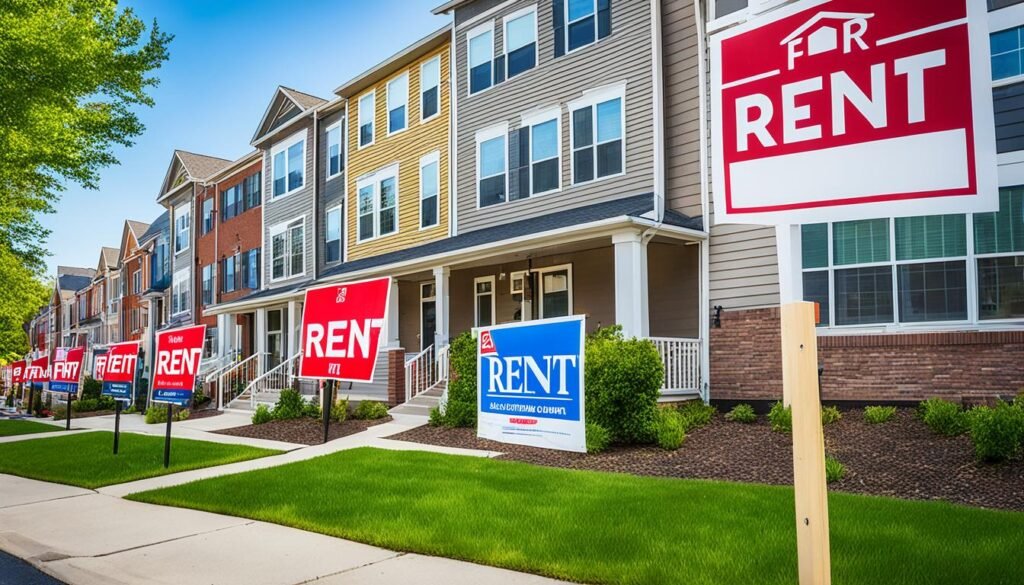Renting to students in the UK is a great choice for landlords. It offers high demand and long rental periods in university areas. But, it also has its own set of challenges like furnishing, wear and tear, and managing tenant changes. This guide will cover the key aspects of renting to students in the UK. We’ll look at HMO licensing, tenancy agreements, and tips for successful student lettings.
Key Takeaways
- Student tenancies usually last at least 12 months, giving landlords steady long-term tenants.
- Properties with about three bedrooms and big communal areas work well for up to three students.
- Offering essentials like washing machines, fridges, and beds can draw in student tenants.
- Landlords must follow legal and regulatory rules, including getting the right licenses and certificates.
- Good communication and a supportive attitude are crucial for a positive landlord-tenant relationship with students.
Why should I rent to students?
Renting to students brings many benefits for landlords. Student areas have a strong and steady demand for housing. This means there’s a lot of competition for properties. Also, student tenancies usually last at least 12 months, giving landlords stability not found in other markets.
Another advantage is the potential to earn more. A two or three-bedroom property can house up to three students. This means higher student rental yields compared to renting to just one person.
Students often don’t mind about the look of furniture or old bathrooms. They see their stay as temporary. This means landlords might spend less on updating the property, making student rentals more attractive financially.
The student rental market is also very predictable. Student predictability is a big plus for landlords. Every year, new students look for places to live, ensuring a steady and consistent tenant demand.

The student rental market offers landlords a chance to tap into a highly sought-after group. But, they must be ready to meet the unique needs of these tenants.
Should landlords consider an HMO (Homes of Multiple Occupancy)?
Renting out rooms to students through an HMO can be profitable for landlords. HMOs let you rent out individual rooms to several tenants, who share common areas like the kitchen and bathrooms. This setup encourages tenants to be financially responsible for themselves.
It also makes it simpler to sublet during summer holidays and to replace tenants. But, landlords must know the rules and licenses needed for HMOs in their area.
HMO Licensing and Regulations
To run an HMO, you need a license from the local council. This license costs about £500 and lasts 5 years. Some councils might require a license even if you house just a few students.
Landlords must also meet safety and legal standards for HMOs. This includes:
- Installing fire and carbon monoxide detectors on every floor
- Ensuring each bedroom has a Yale/key lock for privacy
- Hiring a local cleaner for communal areas
- Getting co-signers on the lease for students without steady jobs
Dealing with HMO licenses and rules can be tricky. It’s crucial for landlords to look into their local laws and get expert advice if needed.
Benefits of HMOs for Student Rentals
HMOs have many benefits for landlords looking to rent to students:
- Higher Rental Yields: Studies show student rentals can earn almost 20% more, with an average yield of 6.6% compared to 5.6% for non-student rentals.
- Easier Tenant Turnover: Swapping out individual tenants in an HMO is easier than finding new tenants for a whole property, especially in summer.
- Shared Responsibilities: With each tenant paying for their own expenses, landlords can manage the property with less involvement.
By weighing the HMO licensing rules and benefits, landlords can decide if an HMO suits their student rental property.

Understanding the Student Housing Market
If you’re thinking about renting to students, it’s key to know the local student housing market well. Start by looking into nearby universities and colleges. Then, check the number of students, their preferences, and the competition in the area.
Researching Local Universities and Colleges
First, find out which universities and colleges are near you. Learn about their student numbers, including undergrads and postgrads. Also, see how many students they’ve had in recent years. This info helps you see how many students might want to live in your area.
Analysing Enrolment Data
Then, dig deeper into the student numbers. Look at how many students are joining each year, how many need off-campus housing, and any changes in demand. This will show you the best times to rent out your properties and make sure you have enough space for students.
Gathering Student Housing Preferences
Talk to current and future students and their families to learn what they want in a place to live. Things like being close to campus, having certain amenities, and the cost can affect their choices. This info lets you make your rentals more appealing to students.
Monitoring Local Real Estate Listings
Watch the local real estate market by checking out student rental listings often. Look at prices, types of properties, and what’s available for students. This helps you see what you’re up against and where you could stand out with your rentals.
Doing your homework on the student housing market helps you make smart choices about your rentals. It gives you an edge in finding and keeping good student tenants.
Legal and Regulatory Considerations
As a landlord renting to students, knowing the UK’s legal and regulatory needs is key. You must understand local rental laws, get the right licenses, and make sure your property meets safety standards. It’s vital to talk to lawyers and local authorities to grasp your legal duties.
Local Rental Regulations
The Code of Practice for Student Housing was first published in 2006. It has been updated several times, most recently in 2010 and 2017. This code sets standards for managing student housing in higher and further education.
This code is an approved guide for managing HMOs under the Housing Act 2004. It details how to manage Houses in Multiple Occupation, which are often student homes.
Licensing and Permits
Landlords must get the right licenses and permits for student properties. This includes HMO licensing for places with five or more people. Also, landlords should know about any local permits for fire safety or waste management.
Building Codes and Safety Standards
Keeping student homes safe is crucial. Properties must follow health and safety laws, including:
- Doing regular Fire Risk Assessments and keeping detailed records
- Having yearly gas safety checks by a Gas Safe installer for gas appliances
- Following electrical installation rules with regular checks and tests
- Meeting lighting standards for good illumination
- Having a PAT policy for all portable appliances
- Providing hot and cold water, with non-drinking water clearly marked
- Ensuring proper waste water removal
- Keeping entrance and bedroom doors secure, with staff needing badges
- Telling students about emergency procedures and contacts
- Following laws if using CCTV
By following these legal and regulatory rules, landlords can make sure their student homes are safe and up to standard.
Preparing Your Rental Property
As a landlord for students, making your property ready is key. You need to clean, fix things, ensure fire safety, and furnish the place well. This makes a comfy home for your student renters.
Cleaning and Repairs
Make sure your property is clean before students move in. Clean all surfaces, floors, windows, and appliances thoroughly. Fix any repairs like leaky taps, old carpets, or damaged walls.
This keeps the property looking great and encourages tenants to look after it.
Fire Safety Measures
Fire safety is very important for students. Put in smoke detectors and carbon monoxide alarms everywhere. Make sure fire extinguishers and fire blankets are easy to find.
Check that all electricals and appliances meet safety standards. Think about using fire-safe furniture and curtains. Regular checks and upkeep show you care about your tenants’ safety.
Providing Amenities and Furnishings
Students have specific needs for their homes. Provide beds, desks, chairs, and wardrobes to make the place comfy and useful. Also, give them basic kitchen items like a fridge, oven, and microwave, along with cooking tools and dishes.
This makes your rental more appealing to students. It shows you’ve thought about their needs.
By getting your property ready well, you create a safe, comfy, and well-equipped home for students. This approach attracts renters and builds a good landlord-tenant relationship. It also lowers the chance of problems during the tenancy.
Formulating Lease and Rental Terms
When renting to students, it’s key to make the right lease and rental agreements. You need to think about things like setting fair security deposits, checking tenant applicants well, and maybe needing rent guarantors or tenant insurance. Getting advice from a lawyer can make sure your lease is complete and follows the law.
Security Deposits
The security deposit helps protect against damages or unpaid rent. For students, finding the right balance is crucial. It should cover your property’s needs but not be too much for your tenants. Look into local laws and what others in the industry think to find a fair amount.
Tenant Screening
Screening tenants well is vital when renting to students. This means checking their background, verifying references, and looking at their job and income. Doing this helps you find trustworthy tenants and lowers the risk of not getting rent or damage to your property.
Guarantors and Tenant Insurance
Thinking about rent guarantors or tenant insurance can also protect your property. Rent guarantors, often a parent or guardian, promise to pay the rent if the student can’t. Tenant insurance covers you against claims and damage, making sure you’re paid back for any losses.
A good lease that covers these points can make for a better landlord-tenant relationship. It can also reduce problems later on. By being proactive and professional, you can confidently enter the student rental market.
Renting to Students
Renting to students has its ups and downs for landlords. It’s key to know the benefits and challenges before adding student rentals to your portfolio.
Advantages of Renting to Students
- In university towns, renting to students can lead to high yields due to strong demand and long tenancies.
- Students usually rent for a year, giving landlords steady income without worrying about empty properties.
- With guarantors like parents, the risk of not getting rent is lower, making it safer for landlords.
- Renting to students can increase a property’s earning potential, especially in sought-after areas.
Potential Drawbacks
Despite the benefits, renting to students also has downsides:
- Students often need more furniture, which means more upkeep and repair costs for landlords.
- There might be void periods during summer holidays when the property is empty.
- Universities and companies offer great living options, making it tough for private landlords to compete.
- Students start looking for places early, so landlords need to advertise early to get noticed.
To overcome these issues, landlords can ask for a guarantor, take upfront rent, or get landlord insurance. Offering amenities that students want can also help keep them happy and loyal.
What About Renting To International Students?
Renting to international students can be both good and challenging for landlords. They might struggle to find a UK-based guarantor but can use university schemes or pay rent early. Landlords need to know about extra legal steps, like Right to Rent checks, for these students.
The rental market for international students is booming, making it a great chance for landlords. More students from abroad are looking for places in London. But, landlords face issues with right to rent checks and no UK guarantor from students.
International students can get a share code on the gov.uk website to prove they can rent. Sometimes, landlords ask for six months’ rent up front instead of a UK guarantor. Students wanting luxury in central London might pay up to £5,000 a month.
Landlords renting to students not from the same family must follow HMO rules. Not having the right HMO license can lead to a huge fine. Plaza Estates helps with right to rent checks, guarantor references, and HMO license applications in central London.
International students like to live in shared places near universities and city centers. They want places with amenities and fun activities nearby. Landlords should offer well-equipped homes with bills and internet included. This helps students who can’t bring their belongings or set up utilities due to no UK credit history.
Renting to international students can be very profitable for landlords. But, it’s important to think about legal stuff, checking out tenants, and what these students need.
Property Management Responsibilities
Renting to students can be a great way for landlords to make money. But, it also means you have to handle certain tasks. You need to keep your property in good shape and support your tenants well.
Property Upgrades and Maintenance
Looking after your student rental property is very important. This means doing upgrades and repairs to keep it nice for your tenants. You might need to update appliances or fix any safety issues. Keeping your property in good condition is key for your tenants’ comfort and safety.
Communication with Tenants
Talking well with your student tenants is crucial for a good landlord-tenant relationship. Make sure you have clear ways to communicate, like regular meetings and a quick way to deal with their worries. Being quick and clear in your communication can stop any confusion and make renting from you a good experience.
Managing Turnover and Inspections
Student rentals often have a lot of people moving in and out, especially at the start and end of the school year. As a landlord, you need to manage this well. This means doing thorough checks and fixing any problems before new tenants arrive. Checking your property regularly can help you keep it in good shape and protect your investment.
| Key Responsibilities for Landlords Renting to Students | Description |
|---|---|
| Landlord Property Maintenance | Coordinating necessary upgrades, repairs, and upkeep to ensure the property remains in good condition. |
| Tenant Communication | Establishing clear communication channels and being responsive to tenant concerns. |
| Managing Turnover and Inspections | Efficiently handling the transition between tenants and conducting regular property inspections. |
By taking care of these responsibilities, landlords can make renting a positive experience for their student tenants. This helps protect their investment and ensures their student rental property does well in the long run.
Protecting Your Student Rental Property
As a landlord renting to students, it’s vital to protect your property. Student rentals often face unique risks, making landlord insurance crucial. A policy tailored to your student rental can help cover these risks.
Preventing damages and losses is key. Use fire safety measures like smoke alarms and fire extinguishers. Keeping the rental in good shape with regular checks and repairs is also important.
Landlord Insurance for Student Rentals
Landlord insurance for student rentals covers various risks, including:
- Liability protection for accidents or injuries
- Coverage for damages like broken windows or furniture
- Protection against theft and vandalism
- Rental income protection if tenants don’t pay rent
When picking a policy, think about your student rental’s specific needs. Look for coverage for common areas, higher liability limits, and special student rental challenges.
Maintaining Property Condition
Regular checks and maintenance are vital for student rentals. Inspect the property between tenancies to spot and fix issues. Make sure furniture, appliances, and utilities are safe and working well.
Using comprehensive insurance and careful management can reduce risks and protect your investment. Focus on landlord insurance for student rentals and liability protection for peace of mind. This way, you can offer a great rental experience to your student tenants.
Student Housing Demand and Supply
If you’re looking to invest in student housing, it’s key to know the demand and supply in your area. Keep an eye on how many students are enrolling and how many places there are for them. This helps you make smart choices about your investments.
Recent findings show some interesting changes in the UK’s student housing market. Less than 12,000 beds were ready for the 2023-24 term, a big drop from over 36,000 in 2019. Also, students were willing to pay more, with budgets outside London going up by 7.3% to £152 per week.
More students are likely to need housing, with a 30% increase expected by 2030. But, there’s a problem on the supply side. New student housing plans fell by over 75% in 2023. This means we might be short of 490,000 student beds by 2026.
| Key Insights | Data |
|---|---|
| Student Housing Supply |
|
| Student Housing Demand |
|
These trends show the importance of keeping an eye on the student housing market. By staying updated, you can make sure your properties meet the students’ needs. This way, you can take advantage of the chances this market offers.
Accommodating Student Needs
For landlords, it’s key to think about what students need and want. Choosing the right property types and providing key furnishings can really help. This makes a big difference for student tenants.
Suitable Property Types
Students do well in places with many bedrooms and shared areas like living rooms and kitchens. These spaces are great for hanging out and working together. Having a garden or being close to transport links is also a big plus, offering places to chill and easy access to university and other places.
What furnishings should I provide for students?
Landlords should make sure the property has the basics for students. This means beds, desks, and things like fridges and cookers. Having these items ready can make moving out easier for students. It lets them concentrate on their studies without worrying about finding these things.
By thinking about what students need and offering the right property and furnishings, landlords can make a great living space. This supports students’ studies and social life.
Being a Good Landlord for Students
Renting to students means you need to be a bit different from other landlords. It’s key to have clear rules, be open, and quick to respond to problems. This way, you and your student renters can have a good relationship.
Setting Clear Expectations
It’s vital to set clear rules for students right from the start. Talk about what you expect for upkeep, house rules, and what happens if they’re not followed. This makes sure everyone knows their role and the value of the property.
Transparency and Communication
Being open and clear with your students builds trust. Talk often, solve problems fast, and share any updates or issues. This makes students feel valued and supported.
Reliability and Responsiveness
Students are often very busy and need a landlord who’s quick to help. Show you’re reliable by fixing things fast, answering questions, and making sure repairs are done well. Being responsive like this helps make a good landlord-student bond.
By being clear, open, and reliable, landlords can make a great place for both themselves and their student tenants. This approach not only builds a strong landlord-student bond but also helps manage student rentals well.
Marketing Student Rental Properties
Marketing your student rental properties well means using the right channels and strategies. Working with local universities and colleges is key. You can put your properties on their approved landlord lists. This makes students trust your listings for finding good places to live.
Using online platforms and property portals is also crucial. Make sure your listings show up when students search for things like “student rental property near [university name]” or “affordable student rentals in [city]”. Talk about what makes your property great for students, like being close to campus, having furnished rooms, and including utilities.
- Collaborate with local universities and colleges to list your properties on their approved landlord lists
- Leverage online platforms and property portals to reach the target student audience
- Optimise your rental listings for student-centric search terms
- Highlight property features and amenities that appeal to student tenants
Social media like Instagram, Facebook, and TikTok are great for reaching students. Make content that shows off the lifestyle and perks of your student-friendly places.
Think about having events on campus or at your property, like open houses or giveaways. This can draw in students and make them think about leasing at your place. Working with local businesses can also help you reach more students.
| Key Strategies for Student Rental Marketing | Potential Benefits |
|---|---|
| Collaborate with universities and colleges | Access to a trusted pool of student renters |
| Optimise online listings for student-centric searches | Increased visibility and lead generation |
| Leverage social media platforms | Engage with the target student audience |
| Host on-campus and on-property events | Attract students and build brand awareness |
| Partner with local businesses | Expand reach and tap into complementary audiences |
By using these strategies, you can draw in and keep student tenants. This means a steady flow of rent and full occupancy.
Conclusion
Renting to students can be rewarding and profitable for UK landlords. It’s important to understand the unique needs and challenges of students. By knowing the local student housing market and following the law, you can make the most of this opportunity.
Key things to consider include meeting safety and quality standards. Also, make sure your property has what students need. Keeping in touch with your tenants is also crucial. This way, you can build a successful student rental business.
The demand for student housing is growing in the UK. With around 25,000 unmet bed spaces and more beds expected by 2024, there are many chances for landlords. By focusing on students and being adaptable, you can attract students and earn a steady income. This supports the next generation’s education and living needs.




